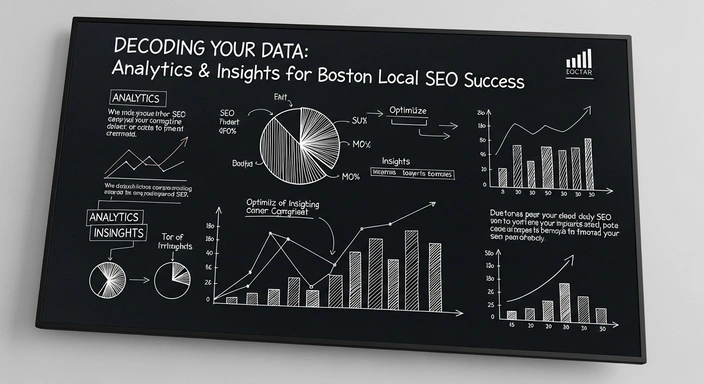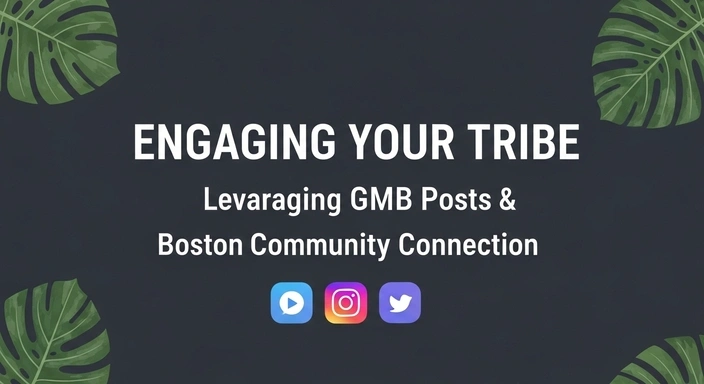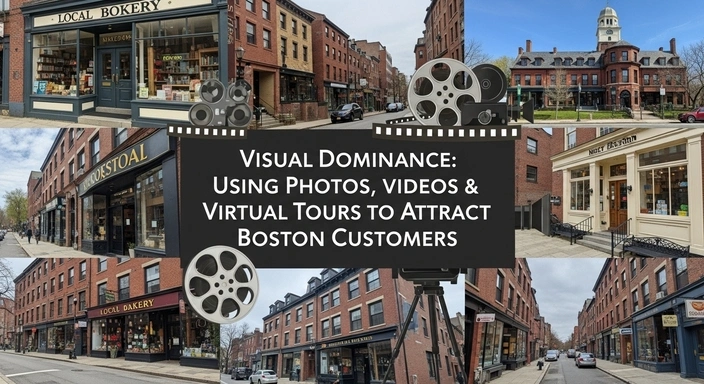This article is the tenth in our 12-part series: Beyond the Boom: How Boston Businesses Can Dominate Local Search & Drive Foot Traffic in a Shifting Economy. If you missed the previous essential guides, catch up on Visual Dominance: Using Photos, Videos & Virtual Tours to Attract Boston Customers. Discover the full series here.
In our comprehensive journey to empower Boston businesses for digital dominance in 2025, we’ve systematically constructed a robust framework: analyzing economic shifts, perfecting Google Business Profile (GBP) optimization, dissecting hyper-local search intent, mastering geo-targeting, cultivating five-star reputations, earning authoritative local links, crafting hyper-local content that converts, achieving visual dominance, and engaging deeply with your local tribe. Each of these pillars is crucial for building a formidable online presence. Yet, even the most meticulously executed strategies will yield suboptimal results without one fundamental element: **Data.**
In the complex and dynamic Boston market of 2025, data is your compass. It’s the only objective way to truly understand what’s working, what’s not, where your opportunities lie, and how to prove the tangible return on investment (ROI) of your local SEO efforts. Without rigorous analytics, even the most brilliant marketing initiatives are akin to navigating Boston’s winding streets without a map—you might get somewhere, but it won’t be efficient, and you won’t know if it’s the right destination. For the ambitious, time-poor Boston business owner, this means moving beyond gut feelings and focusing relentlessly on measurable insights that drive actionable strategic decisions.
Google provides a wealth of free, powerful tools specifically designed for local businesses: Google Business Profile Insights, Google Analytics 4 (GA4), and Google Search Console (GSC). When combined with specialized local SEO analytics platforms, these tools offer an unparalleled 360-degree view of your online performance, revealing precisely how Bostonians are finding, engaging with, and converting into customers. In an era where economic caution persists (as highlighted by the Federal Reserve Bank of Boston’s June 2025 Beige Book, noting “consumers appeared increasingly cautious”), proving the value of every marketing dollar is non-negotiable. Data provides that proof.
Furthermore, the increasing integration of Artificial Intelligence (AI) into analytics platforms is transforming how we collect, process, and interpret data. AI-powered insights can identify hidden trends, predict future outcomes, and automate reporting, allowing Boston businesses to make smarter, faster decisions. This comprehensive guide will deep dive into the art and science of “decoding your data” for Boston local SEO success. We will explore the critical Key Performance Indicators (KPIs) to track, provide meticulous, step-by-step guidance on leveraging Google’s core analytics tools, delve into specialized local SEO platforms, and illuminate how to translate raw numbers into actionable, high-impact strategies that fuel continuous growth and cement your local market leadership in Boston.
—
The Strategic Imperative: Why Local SEO Analytics Are Non-Negotiable in 2025

For any Boston business committed to sustained growth and competitive advantage in 2025, a robust local SEO analytics strategy is not merely a beneficial add-on; it is an absolute necessity. Data serves as the bedrock upon which all effective digital marketing is built, especially in the nuanced landscape of local search.
1. Understanding Performance: Beyond Guesswork to Precision
Without accurate data, assessing the effectiveness of your local SEO efforts is pure speculation. Analytics provide concrete evidence of what is working and what isn’t. For instance, knowing that your GBP listing received 500 “Direction Requests” in a month from users searching in the Seaport District, or that a specific local blog post is driving 200 qualified leads from Cambridge, allows you to confidently double down on successful strategies and adjust underperforming ones. This precision replaces costly guesswork with informed decision-making.
2. Identifying Opportunities: Unveiling Hidden Pathways to Growth
Data illuminates opportunities that would otherwise remain hidden. By analyzing search queries, user pathways, and engagement metrics, you can discover untapped keywords, identify underserved geographic areas within Boston, or pinpoint content gaps that, if addressed, could unlock significant new customer segments. For example, noticing a surge in “bakery near me Allston” searches but low click-through rates on your GBP might indicate your photos or reviews aren’t compelling enough, signaling an immediate area for improvement (as discussed in Post 2 and Post 8).
3. Proving ROI: Justifying Your Marketing Investment
In a cautious economic climate where businesses are scrutinizing every expenditure (as per the Federal Reserve Bank of Boston’s June 2025 Beige Book), proving the tangible return on investment (ROI) of your local SEO efforts is paramount. Analytics provide the hard numbers needed to demonstrate that your online visibility translates directly into phone calls, foot traffic, online bookings, and ultimately, revenue. Presenting a clear ROI helps justify continued investment in local SEO and secures buy-in from stakeholders.
4. Competitive Intelligence: Benchmarking for Strategic Advantage
Analytics allow you to benchmark your performance against local competitors. While direct competitor data is often elusive, by understanding your own market share for key local keywords, your visibility in local packs, and your conversion rates, you can infer your competitive standing. Advanced tools can even provide competitive insights into rankings and backlink profiles, offering strategic intelligence for outmaneuvering rivals in the Boston market.
5. Continuous Optimization: The Iterative Cycle of Success
Local SEO is not a “set it and forget it” endeavor. It’s an iterative process of continuous improvement. Data provides the feedback loop. By regularly analyzing your metrics, you can identify anomalies, test new strategies (e.g., A/B test different GBP post CTAs), refine existing tactics, and proactively adapt to algorithm changes or shifts in Boston consumer behavior. This allows for agile decision-making and sustained growth.
—
Key Performance Indicators (KPIs) for Boston Local SEO Success
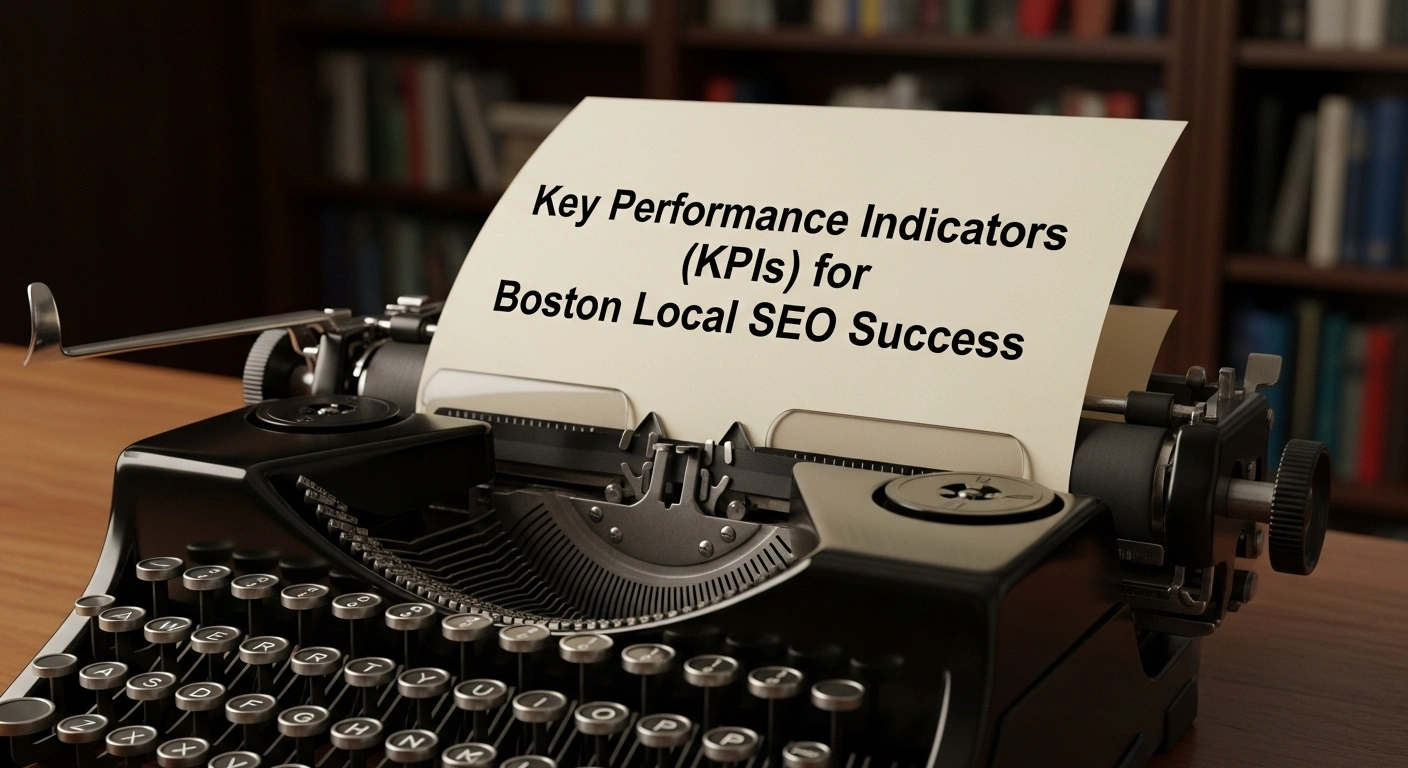
Before diving into the tools, it’s essential to define the critical Key Performance Indicators (KPIs) that truly matter for local SEO. These metrics directly reflect your visibility, engagement, and conversion success.
1. Visibility Metrics: Are Bostonians Finding You?
These KPIs tell you how often and where your business is appearing in local search results.
- Local Pack Impressions: The number of times your business listing appeared in the highly coveted local 3-pack on Google Search. This is a primary indicator of your local ranking performance.
- Google Maps Views: How many times your business was viewed directly within Google Maps.
- Overall GBP Views: The total number of times your business profile was viewed across Google Search and Maps.
- Direct vs. Discovery Searches:
- Direct Searches: When users specifically searched for your business name or address. This indicates strong brand awareness and reputation.
- Discovery Searches: When users searched for a category, product, or service that led to your business (e.g., “bakery near me,” “plumber Boston”). This reveals the effectiveness of your SEO optimization for generic local queries and intent. A high percentage of discovery searches is usually a sign of successful SEO efforts.
- Local Search Ranking: Your position in local search results for target geo-modified keywords (e.g., “best pizza North End,” “lawyer Financial District”). Tracked via specialized local rank trackers.
- Organic Search Impressions (Localized): The number of times your website appeared in organic search results for locally relevant keywords (e.g., “Boston web design services”). Tracked in Google Search Console.
2. Engagement Metrics: Are Bostonians Interacting?
These KPIs tell you how users are interacting with your business profile and website after finding you.
- GBP Clicks:
- Website Clicks: Users clicking through to your website from your GBP.
- Call Clicks: Users initiating a phone call directly from your GBP.
- Direction Clicks: Users requesting directions to your physical location.
- Message Clicks (Chat Clicks): Users initiating a direct message through your GBP messaging feature (newly tracked in July 2025).
- GBP Post Interactions: Views and clicks on your Google Business Profile Posts.
- Review Engagement: Number of new reviews, average star rating, response rate, sentiment analysis of reviews.
- Q&A Interactions: Questions asked and answers provided on your GBP.
- Photo/Video Views: Engagement with your visual content on GBP.
- Website Engagement Metrics (from GA4):
- Engaged Sessions: Sessions that last longer than 10 seconds, have 2+ page views, or have a conversion event. This indicates genuine interest.
- Average Engagement Time: The average duration users spend actively engaged on your website.
- Pages Per Session: How many pages users view on average.
- Bounce Rate: The percentage of single-page sessions (users leaving immediately). A low bounce rate is generally good.
3. Conversion Metrics: Are Bostonians Becoming Customers?
These are the ultimate KPIs, directly reflecting business outcomes and ROI.
- Phone Leads: Total calls generated (from GBP, website, call tracking numbers).
- Form Submissions: Online contact forms, quote requests, service inquiries.
- Online Bookings/Appointments: Scheduled appointments through your website.
- Online Purchases: E-commerce transactions.
- Foot Traffic: While hard to track precisely, direction requests from GBP and correlated in-store sales can provide estimates. Advanced solutions like Wi-Fi analytics or proximity beacons can offer more direct measures.
- Quotes Requested/Sales: The number of actual quotes or sales attributed to local SEO channels.
—
Google’s Core Analytics Tools: Your Command Center for Boston SEO
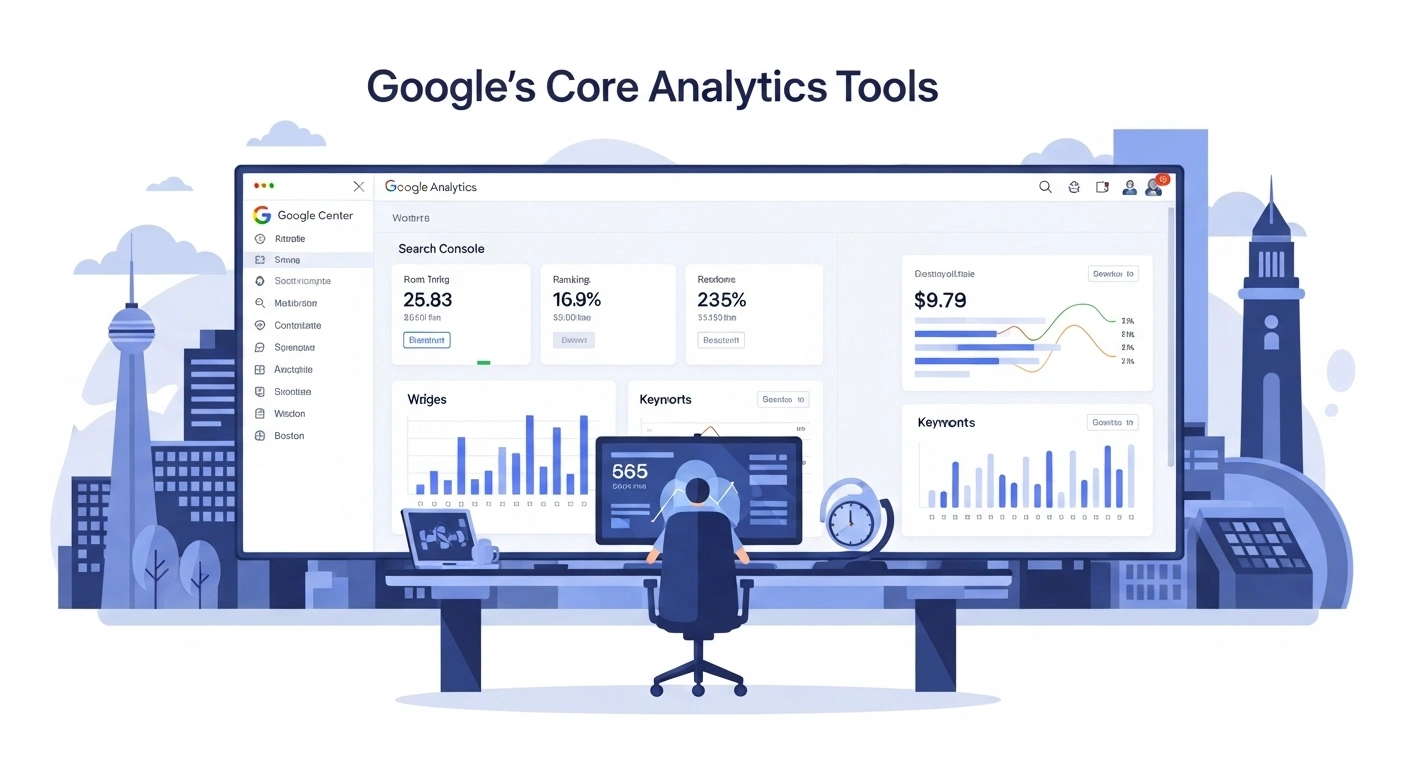
Google provides a powerful suite of free tools that are indispensable for any Boston business owner committed to data-driven local SEO. Mastering these platforms is paramount for comprehensive performance analysis.
1. Google Business Profile (GBP) Insights: Your Local Dashboard
GBP Insights (now often integrated directly into the Google Search or Maps interface when you search for your own business while logged in) is your primary source for understanding how customers find and interact with your business *directly on Google’s platforms*.
- How to Access: Simply search for your business name on Google Search or Maps while logged into the Google account associated with your GBP. You’ll see an “Edit profile,” “Promote,” or “Performance” button. Click “Performance” to access insights.
- Key Reports & Interpretation:
- “How customers search for your business”: This report breaks down searches into “Direct” (branded searches for your business name) and “Discovery” (unbranded searches for categories, products, or services). A healthy GBP should see growth in both, with “Discovery” indicating successful SEO efforts beyond brand awareness.
- “Where customers view your business”: Shows if your listing appeared more often in Google Search results or Google Maps results. This helps you understand which Google platform is driving more visibility.
- “Customer actions”: This is a critical section for conversion. It tracks direct website visits, phone calls, direction requests, and messages initiated from your GBP. Monitor these month-over-month. A surge in “Direction Requests” might indicate a successful local event or promotion (as explored in Post 4).
- “Search queries”: This is a goldmine for keyword research and content strategy. It lists the exact search terms customers used to find your business. Look for unexpected phrases, new long-tail opportunities, and confirm that you’re appearing for your target geo-modified keywords (e.g., “best pho Dorchester,” “accountant near Seaport”). Use this to refine your GBP description and website content (Post 7).
- “Photos”: Tracks the number of views your business photos receive compared to other businesses in your category. More views often correlate with higher engagement. Analyze which photos perform best to inform your visual content strategy (Post 8).
- “Popular times”: Shows when your business is busiest. While not a direct ranking factor, this data can inform staffing, promotional timing (e.g., running specials during slower periods), and even GBP post scheduling. For a Boston restaurant, this might show peak lunch times for Financial District workers or weekend evening surges in the North End.
- “Post performance”: Provides views and clicks for your Google Business Profile Posts, helping you understand which types of updates resonate most with your local audience (Post 9).
- Reporting: You can download GBP insights reports for specific date ranges (e.g., monthly, quarterly) to track trends over time.
2. Google Analytics 4 (GA4) for Local SEO: Your Website Behavior Hub
GA4 is Google’s latest analytics platform, and its event-based model is highly powerful for tracking granular user behavior and conversions on your website, providing deep insights into your local SEO effectiveness.
- Setting up GA4 for Local Tracking:
- Connect with Google Business Profile: Ensure your GBP links directly to your GA4-enabled website.
- Enhanced Measurement: Enable “enhanced measurement” for automatic tracking of page views, scrolls, outbound clicks, site search, video engagement, and file downloads.
- Custom Events & Conversions: This is critical for local SEO:
- Phone Call Tracking: Set up custom events for clicks on phone numbers on your website (e.g., `tel: links`). Mark these as conversions.
- Form Submissions: Track contact form submissions as conversions.
- Button Clicks: Track clicks on specific local CTAs like “Get a Quote Boston,” “Book Now Back Bay,” or “Request Appointment.”
- Directions Clicks (if applicable on website): If you embed a map with a directions button on a local page.
- Downloads: Track downloads of local guides or resource PDFs.
- Key Reports & Interpretation:
- Geo Reports (Demographics & Tech):
- Navigate to `Reports > User > Demographics > Demographics overview > By Country / City`. This is vital for local SEO. See which cities (Boston, Cambridge, Newton, Quincy) and regions your website traffic is coming from.
- **Custom Segments for Boston Neighborhoods:** For advanced analysis, create custom audience segments in GA4 based on specific Boston zip codes (e.g., 02108 for Financial District, 02116 for Back Bay, 02127 for South Boston) if you have sufficient traffic volume. This allows for hyper-local performance analysis.
- Traffic Acquisition Reports (`Reports > Acquisition > Traffic acquisition`):
- Analyze default channel groups (Organic Search, Direct, Referral, Social). See how much traffic is coming from organic search (local SEO efforts) and from your Google Business Profile (Direct searches, or sometimes Referral).
- Drill down into “Organic Search” to see landing pages and related queries. Look for surges in organic traffic to your local landing pages or hyper-local blog posts (Post 7).
- Analyze “Referral” traffic to see how much is coming from your social media efforts (Post 9) or local backlinks (Post 6).
- Engagement Reports (`Reports > Engagement > Overview`):
- Engaged Sessions & Average Engagement Time: High values indicate your content is relevant and valuable, satisfying user intent.
- Pages and Screens: See which specific local pages are most popular (e.g., your “Southie Services” page, your “North End Restaurant Menu” page).
- Monetization/Conversions Reports (`Reports > Monetization > Conversions` or `Reports > Engagement > Conversions`):
- Track the completed local conversions (phone calls, form fills, bookings).
- Analyze conversion rates by source, medium, and landing page to identify which local SEO tactics are most effective at driving actual business.
- Explorations: Use GA4’s “Explorations” feature for advanced analysis, such as building custom funnels for local user journeys (e.g., User lands on “Boston blog post” > navigates to “Service Page” > “Contact Form Submission”).
- Geo Reports (Demographics & Tech):
3. Google Search Console (GSC) for Local SEO: Your Visibility & Indexing Report Card
GSC provides crucial insights directly from Google about how your website is performing in organic search results, including local nuances. It focuses on impressions, clicks, ranking positions, and technical health.
- How to Access: Visit search.google.com/search-console/. Ensure your website property is verified.
- Key Reports & Interpretation:
- Performance Report: This is your most vital report.
- Queries: See the exact keywords users typed to find your website. Filter by queries containing local modifiers (e.g., “Boston,” “Cambridge,” “Fenway”) to see your local visibility.
- Pages: See which of your specific local pages (e.g., service area pages, local blog posts) are ranking and getting clicks.
- Countries/Cities Filter: Apply a “City” filter to see your impressions and clicks specifically from Boston and surrounding towns. This is invaluable for gauging local organic visibility.
- Average CTR & Position: Understand your click-through rates and average ranking position for local keywords. A low CTR on a high-ranking local keyword might indicate a weak meta description or title tag (Post 7).
- Index Coverage Report: Ensure all your important local content pages are indexed by Google. Address any “Errors” or “Excluded” pages that might prevent your valuable local content from being found.
- Core Web Vitals Report: Monitor the performance of your website pages as experienced by real users. Poor Core Web Vitals (especially INP, LCP, CLS) can negatively impact rankings, even for excellent local content. This helps ensure your website is fast and responsive for Boston mobile users.
- Enhancements Report (Schema Markup): Validate your schema markup implementation (Local Business, Product, FAQPage). Errors here can prevent your content from appearing as rich snippets or directly in AI Overviews, which are critical for local intent fulfillment.
- Links Report: See which websites are linking to yours. Analyze this for new local backlinks and identify potential toxic links (as discussed in Post 6).
- Performance Report: This is your most vital report.
—
Specialized Local SEO Analytics Tools: Beyond Google’s Ecosystem
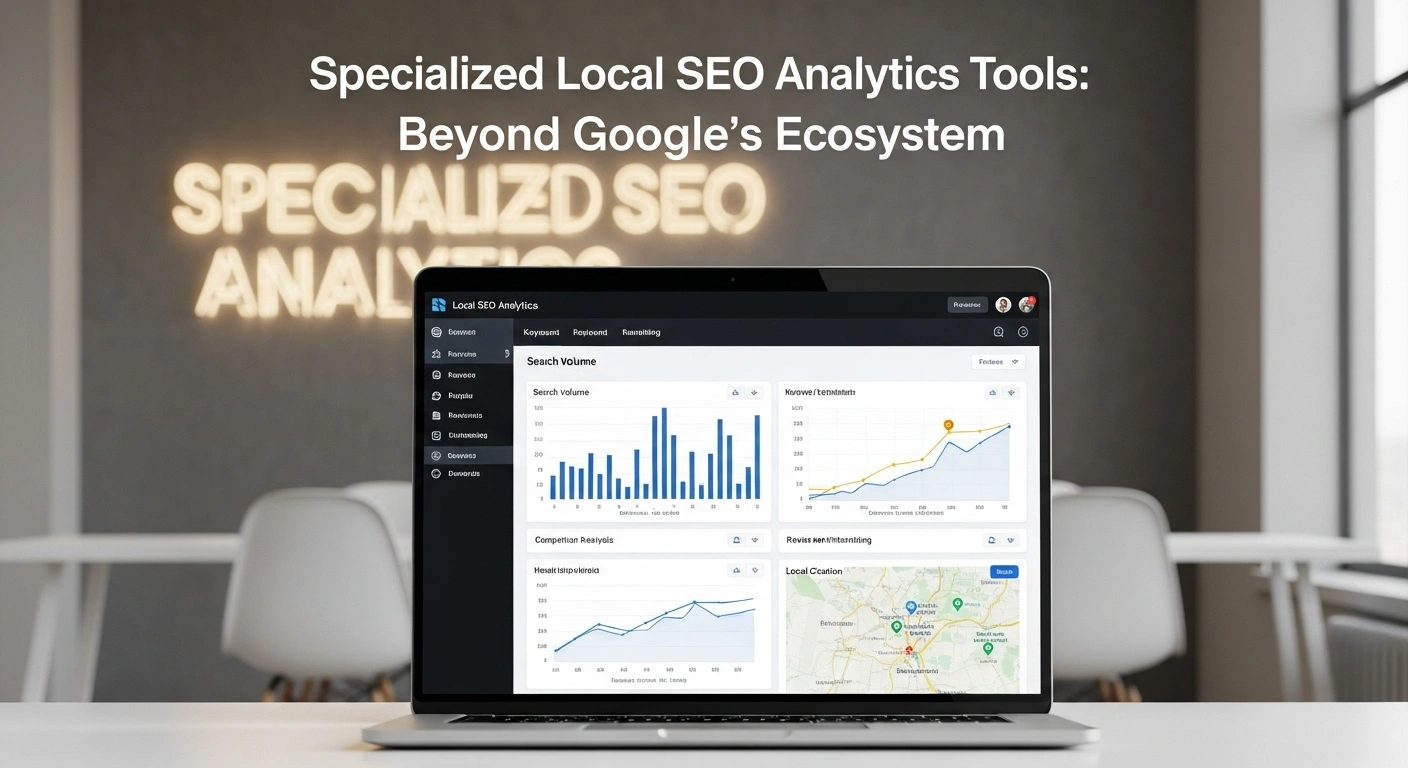
While Google’s free tools are foundational, combining them with specialized local SEO platforms provides a more comprehensive, competitive, and actionable view of your performance.
1. Local Rank Tracking Tools: Pinpointing Geographic Performance
These tools are indispensable for understanding your precise ranking performance in specific geographic areas, beyond just general organic rankings. They allow you to track your position in the local pack and localized organic results for target keywords *from different vantage points* within Boston.
- Examples: BrightLocal, Semrush Local SEO, Whitespark Local Rank Tracker, SERPwatch, Moz Local.
- How to Use:
- Geo-Specific Tracking: Set up tracking for your primary local keywords (e.g., “best Italian restaurant,” “commercial plumber”) from various Boston zip codes, neighborhoods (e.g., North End, Southie, Financial District, Back Bay, Jamaica Plain), or even specific street addresses. This reveals your true geographic reach.
- Local Pack vs. Organic: Track your performance in both the local 3-pack and the broader localized organic results.
- Competitor Benchmarking: Track your local competitors’ rankings for the same keywords. Identify areas where they outperform you and analyze their strategies.
- Reporting: Generate reports that visualize your ranking performance across a geographic grid (heatmaps) to easily identify strengths and weaknesses.
2. Call Tracking Solutions: Precise Phone Lead Attribution
While GBP and GA4 can track phone clicks, a dedicated call tracking solution (e.g., CallRail, WhatConverts) provides far more granular data on actual phone leads generated by your local SEO efforts.
- Dynamic Number Insertion (DNI): Display different phone numbers on different sources (e.g., one for GBP, one for your website, one for a specific landing page). DNI can even dynamically swap numbers based on how a user found your site.
- Call Recordings: Listen to recorded calls to understand caller intent, common questions, and sales effectiveness (ensure legal compliance).
- Attribution: Pinpoint the exact marketing channel (e.g., “Google Maps,” “Organic Search,” “Yelp”) that generated each phone call.
- Integration: Many call tracking solutions integrate with GA4, allowing you to see call data directly within your web analytics reports.
3. Review Management Platforms: Holistic Reputation Analysis
Platforms like Birdeye, Podium, Broadly, or Reputation.com offer robust analytics specifically for your online reviews, which are crucial for local SEO and trust (Post 5).
- Overall Star Rating: Track your average rating across all platforms.
- Review Volume & Velocity: Monitor how many new reviews you’re getting and how quickly.
- Sentiment Analysis: AI-powered tools analyze review text to identify positive, negative, and neutral sentiment, and pinpoint common themes (e.g., “staff friendly,” “food cold,” “great service”).
- Response Rate & Time: Track how quickly you’re responding to reviews.
- Competitor Review Benchmarking: Compare your review performance against local competitors.
- Platform Breakdown: See which platforms are generating the most reviews and where your reviews are strongest/weakest.
4. Citation Audit & Management Tools: NAP Consistency Scorecard
Tools like BrightLocal or Whitespark Citation Builder help you audit your NAP consistency across hundreds of online directories and identify errors that can harm your local SEO.
- NAP Score: Get a clear score indicating your citation accuracy.
- Error Identification: Pinpoint exactly where your NAP data is inconsistent.
- Duplicate Listings: Identify and help merge duplicate GBP listings that can confuse Google.
—
Analyzing Data for Actionable Insights: The “So What?” for Boston Businesses

Collecting data is only the first step. The true value lies in interpreting that data to derive actionable insights that directly inform your local SEO strategy and drive continuous improvement. This is where the analytics becomes truly powerful for the ambitious Boston business owner.
1. Identifying Trends & Anomalies: Spotting the Shifts in Boston
- Seasonal Trends: Analyze historical data in GA4 and GBP Insights to identify seasonal peaks and troughs in search interest, traffic, and conversions (e.g., increased searches for “Patriots Day events” in April, “holiday shopping Newbury Street” in December). Adjust your content and promotions accordingly.
- Algorithm Updates: After a Google core algorithm update (like the June 2025 update), monitor your rankings and traffic closely in GSC and GBP. Look for significant fluctuations and correlate them with the update’s known focus (e.g., a drop might indicate a helpfulness or E-E-A-T issue).
- Local Events: Track the impact of major Boston events (e.g., Boston Marathon, Boston Calling, college graduations) on your local search performance. Did you see a spike in relevant queries or direction requests?
- Remote Work Impact: Analyze traffic patterns for businesses in downtown Boston. Lower foot traffic in the Financial District might show in declining direction requests from office hours, but potentially increasing web visits during evenings/weekends from local residents. This might inform a shift in your geo-targeting or content strategy.
- Anomalies: Look for unexpected spikes or drops in traffic or conversions. Investigate the cause (e.g., a news mention, a competitor’s campaign, a technical issue).
2. Pinpointing Strengths & Weaknesses: Optimizing Your Local Foundation
- Visibility Gaps: If you’re getting many “Discovery Searches” but your average position for a key local keyword is low, it means you’re appearing but not prominently. Focus on GBP optimization (more reviews, better photos) and website authority (content, links).
- Engagement Bottlenecks: If you have high GBP views but low click-through rates (CTR) to your website or phone calls, your profile might not be compelling enough. Analyze your GBP photos, business description, and reviews. Perhaps your “Quick Edit” title/meta description needs to be more persuasive.
- Conversion Failures: If users are reaching your local landing pages but not converting, analyze your on-page CTAs, form design, site speed, and mobile experience. Is the value proposition clear? Is the process frictionless?
- Content Performance: Identify your top-performing local blog posts (high traffic, engagement, conversions). Replicate their success and update underperforming content.
3. Benchmarking Against Competitors: Learning from the Best (and Worst) in Boston
- Local Pack Share: Use local rank trackers to see how often you appear in the local pack compared to your top Boston competitors for key terms.
- Review Comparison: Compare your average star rating, review volume, and recency against competitors using review management platforms. This highlights reputation gaps.
- Backlink Profile: Use link analysis tools (Ahrefs, Semrush) to analyze your local competitors’ backlinks. Discover local sources they’ve acquired links from and strategize ways to earn similar ones.
4. Data-Driven Decision Making: Translating Insights to Action
- Content Strategy: Use “Search Queries” from GBP and GSC to inform new hyper-local blog post ideas or to optimize existing content. (e.g., If “vegan restaurants Cambridge” is a rising query, create a detailed guide).
- GBP Optimization: If “Direction Requests” are low, optimize exterior photos, improve your address accuracy, or run a GBP post promoting a local event at your location. If reviews are lagging, implement a more aggressive review generation strategy.
- Geo-Targeting Refinement: If GA4 shows low traffic from a target Boston neighborhood, strengthen your dedicated service page for that area or build more local links there.
- Budget Allocation: Use ROI data to allocate marketing budget more effectively, directing resources towards the local SEO channels and tactics that yield the highest return.
- User Experience Improvements: Address Core Web Vitals issues revealed by GSC. If GA4 shows high bounce rates on mobile local pages, prioritize mobile optimization.
—
AI’s Transformative Role in SEO Analytics & Insights (2025): The Intelligent Compass

Artificial Intelligence is profoundly reshaping the field of SEO analytics, moving beyond mere data reporting to offer predictive capabilities, automated insights, and sophisticated anomaly detection. For Boston businesses, AI-powered analytics platforms are becoming the intelligent compass guiding their local SEO journey.
1. Predictive Analytics: Forecasting Local Trends
AI algorithms can analyze vast historical datasets (including your own GA4 data, industry trends, and local economic indicators) to predict future outcomes. This allows Boston businesses to:
- Forecast Demand: Predict seasonal spikes in local search queries or foot traffic (e.g., predicting demand for snow removal services in Boston winters, or tourism-related searches in the summer).
- Anticipate Churn: GA4’s predictive metrics can estimate user churn probability and purchase probability for specific local segments, allowing for proactive re-engagement strategies.
- Identify Emerging Opportunities: AI can spot nascent trends in local search behavior or new opportunities within Boston neighborhoods before they become mainstream.
2. Automated Insights & Anomaly Detection: Your Digital Analyst
Modern analytics platforms, including GA4’s own AI insights, increasingly use AI to surface key findings automatically.
- Anomaly Detection: AI can automatically flag unusual spikes or drops in local traffic, conversions, or rankings, alerting you to potential issues (e.g., a sudden ranking drop due to an algorithm update, or a surge in traffic due to a local news mention).
- Contribution Analysis: AI can identify which specific factors contributed to a change in metrics (e.g., “The increase in direction requests from Dorchester was primarily driven by a surge in mobile searches after your recent GBP post”).
- Automated Reporting: AI can generate customized, regular reports summarizing key local SEO performance metrics, saving valuable time for business owners.
3. AI-Powered Data Interpretation & Recommendations
AI goes beyond just identifying trends; it can assist in interpreting complex data patterns and even suggest actionable recommendations.
- Sentiment Analysis: AI excels at analyzing the sentiment of large volumes of customer reviews and social media mentions, providing quick insights into your local reputation and common pain points (as discussed in Post 5).
- Attribution Modeling: AI is transforming multi-touch attribution models, providing more accurate credit to each touchpoint (e.g., GBP, social media, organic search, website visit) in the complex local customer journey.
- Personalized Recommendations: Some AI tools can suggest personalized SEO recommendations based on your unique data profile (e.g., “Consider creating content targeting [specific Boston neighborhood] based on rising search queries and competitor gaps”).
4. Challenges & Ethical Considerations
While powerful, AI in analytics comes with challenges:
- Data Privacy: Increased reliance on personal data raises privacy concerns.
- Bias: AI algorithms can inherit biases from their training data, leading to skewed insights. Human oversight is always critical.
- Interpretability: The “black box” nature of some AI models can make it difficult to understand *why* a certain recommendation was made.
—
Reporting & Communication: Translating Data into Business Strategy for Boston Owners

For the ambitious but time-poor Boston business owner, complex data arrays are meaningless without clear, concise, and actionable insights. The ability to translate raw numbers into a compelling narrative of ROI and strategic direction is paramount.
1. Focus on Business Goals & ROI
Every report should start and end with how your local SEO efforts are contributing to the business’s overarching goals. For a restaurant, this might be “Increased table bookings.” For a service provider, “More qualified leads.” For a retail shop, “Increased foot traffic.” Quantify the ROI in terms of leads, sales, and revenue.
2. Simplify & Visualize Data
Avoid jargon. Use clear, intuitive charts, graphs, and dashboards to present data. Visualizations make complex trends immediately understandable. For example:
- KPI Dashboard: A single page showing month-over-month trends for your top 3-5 local SEO KPIs (e.g., GBP conversions, local pack impressions, local organic traffic).
- Geo-Heatmaps: Use local rank tracking tools to generate visual heatmaps showing your ranking performance across Boston neighborhoods.
- Funnel Visualizations: Show the conversion path from “Discovery Search” to “Phone Call” in a clear funnel diagram.
3. Provide Actionable Recommendations (The “So What?”)
Every data point should lead to a “so what?” What does this data mean for your business, and what specific actions should be taken based on it? For example:
- “Our GBP ‘Direction Requests’ from the Seaport are up 20% this month. We recommend allocating more GBP Post budget to promotions targeting Seaport businesses and residents.”
- “We’re seeing a high volume of ‘Discovery Searches’ for ‘vegan restaurants Cambridge,’ but our conversion rate for that page is low. Recommendation: Improve the photos on that landing page and add more clear calls to action for online ordering.”
4. Regular Reporting Cadence
Establish a consistent reporting schedule (monthly, quarterly) that aligns with your business’s planning cycles. Regular review allows for timely adjustments and keeps local SEO top of mind.
5. Collaborative Approach
Analytics shouldn’t be a solo endeavor. Encourage cross-departmental collaboration (sales, marketing, customer service). Insights from one department can inform another’s strategy, creating a unified approach to local business growth.
—
Conclusion: Your Data — The Ultimate Compass for Boston Local SEO Success
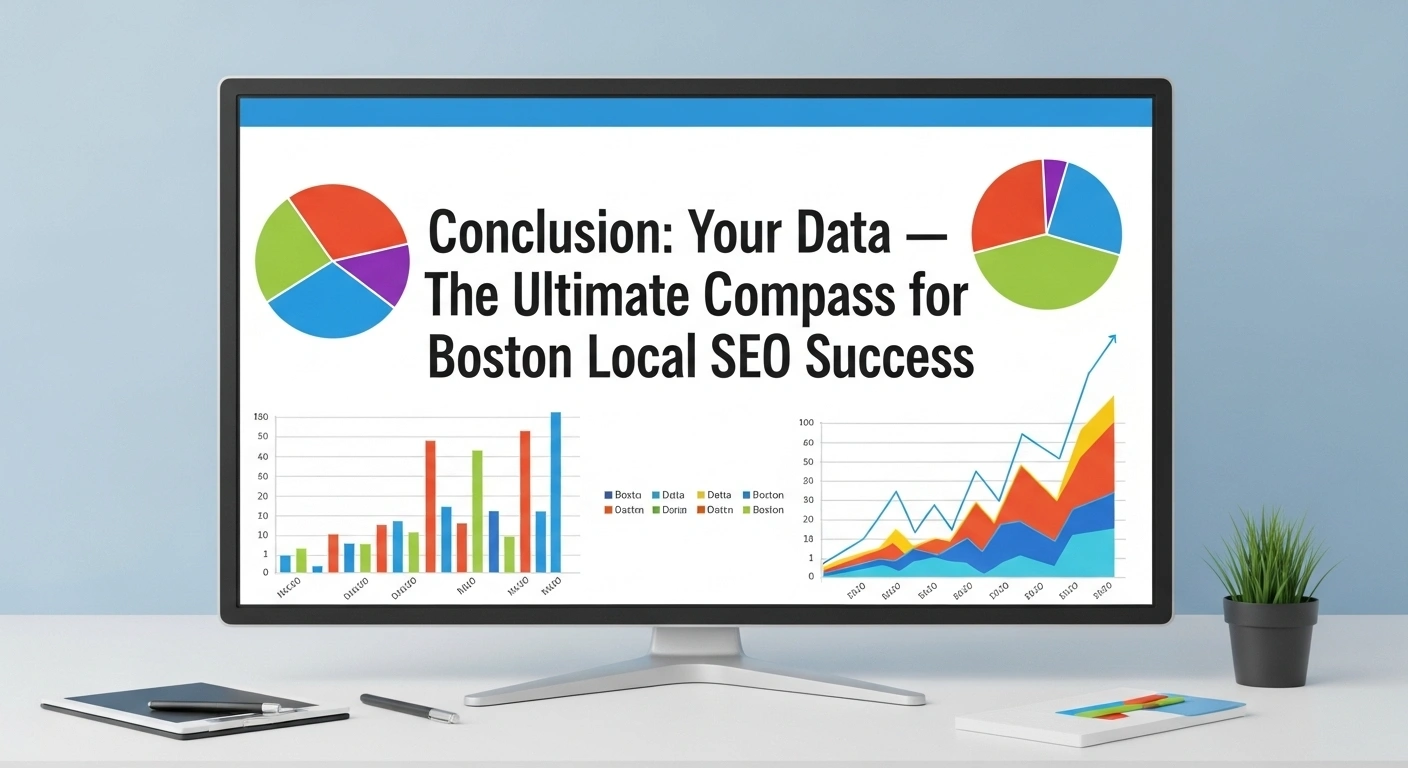
In the complex, ever-evolving Boston market of 2025, where economic shifts demand precise strategies and AI transforms the very nature of search, **decoding your data is not merely an analytical exercise; it is the ultimate compass for navigating your business toward unparalleled local SEO success.** Without rigorous, ongoing measurement and insightful interpretation, even the most robust optimization efforts risk being inefficient and ultimately unproven.
By mastering Google’s powerful core analytics tools—Google Business Profile Insights, Google Analytics 4, and Google Search Console—and strategically integrating specialized local SEO platforms, your Boston business gains an unprecedented clarity into its online performance. This data-driven approach empowers you to identify critical KPIs, uncover hidden opportunities, pinpoint weaknesses, prove tangible ROI, and proactively adapt your strategies to consistently outperform competitors. Leveraging the transformative power of AI in analytics further refines your insights, offering predictive capabilities and automated efficiencies that were once unimaginable.
This comprehensive guide has equipped you with the definitive blueprint for decoding your data and translating raw numbers into actionable, high-impact strategies. True local SEO mastery is an iterative cycle of optimization fueled by intelligent analysis. With data as your unwavering guide, your Boston business can not only weather any economic storm but consistently chart a course toward sustained growth, enduring prominence, and unshakeable market leadership.
Your journey to local dominance is nearing its pinnacle. You’ve mastered the building blocks and the analytical tools. Next, we’ll shift our focus to optimizing for the pervasive mobile-first landscape, ensuring your business is perfectly positioned to capture Bostonians on the go.
Is your Boston business drowning in data but struggling to extract actionable insights or prove the ROI of your local SEO efforts? The experts at **seobostonma.com** specialize in advanced local SEO analytics and data-driven strategy development that delivers measurable results for Boston businesses like yours. Schedule a free consultation with our team today and let’s transform your data into your most powerful tool for strategic growth and unparalleled local dominance.


